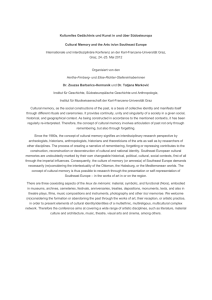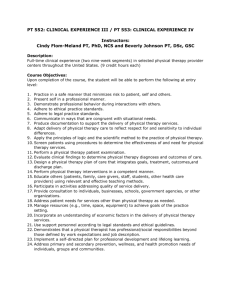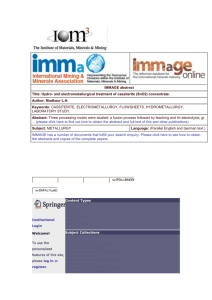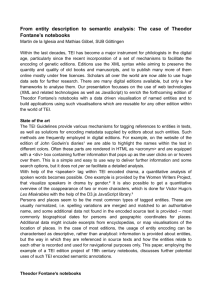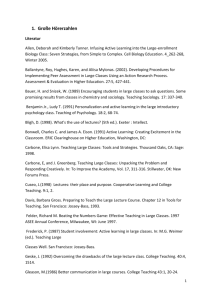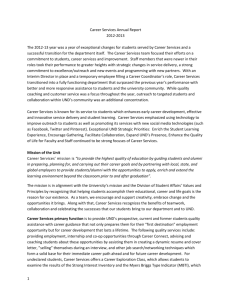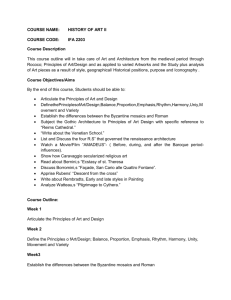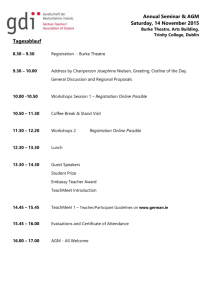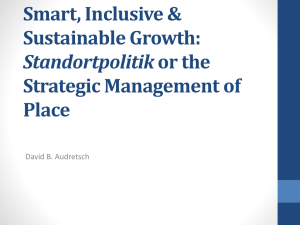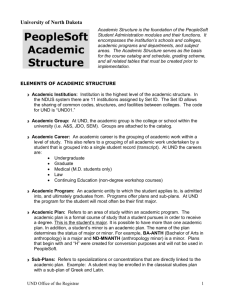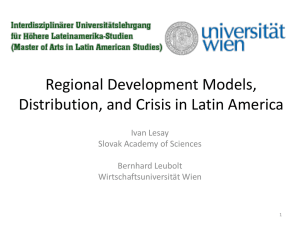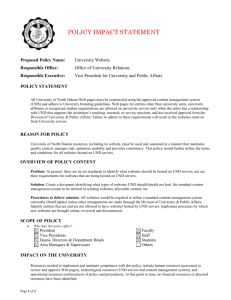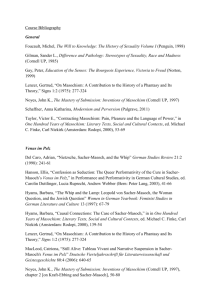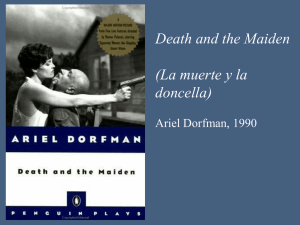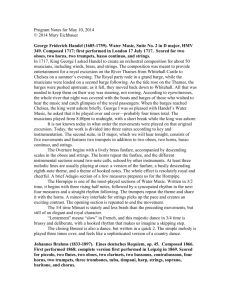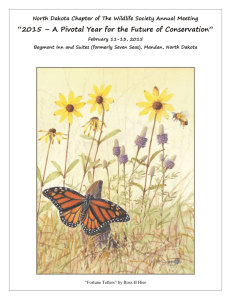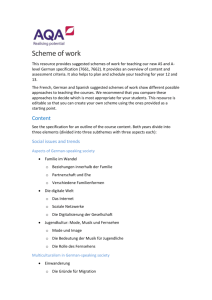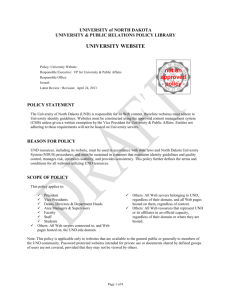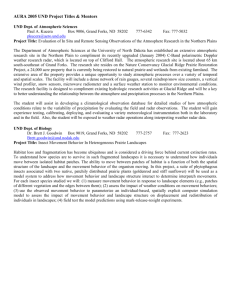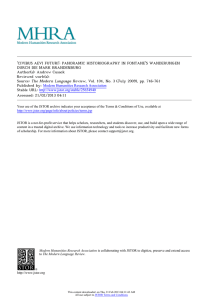Essay Topics and Bibliography
advertisement
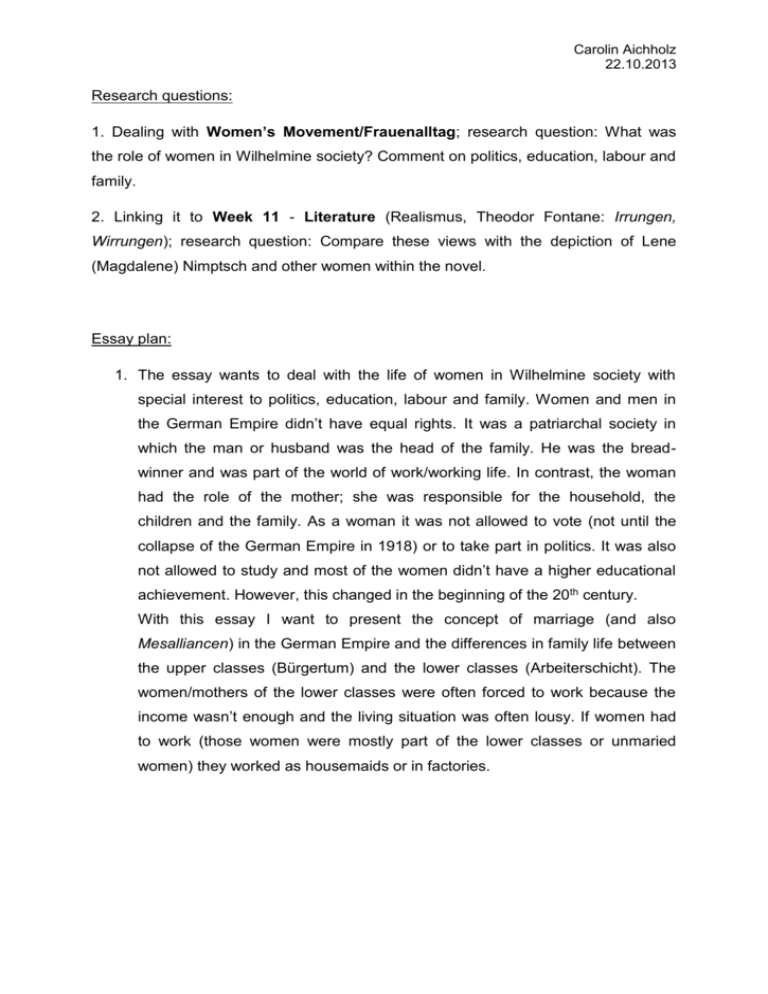
Carolin Aichholz 22.10.2013 Research questions: 1. Dealing with Women’s Movement/Frauenalltag; research question: What was the role of women in Wilhelmine society? Comment on politics, education, labour and family. 2. Linking it to Week 11 - Literature (Realismus, Theodor Fontane: Irrungen, Wirrungen); research question: Compare these views with the depiction of Lene (Magdalene) Nimptsch and other women within the novel. Essay plan: 1. The essay wants to deal with the life of women in Wilhelmine society with special interest to politics, education, labour and family. Women and men in the German Empire didn’t have equal rights. It was a patriarchal society in which the man or husband was the head of the family. He was the breadwinner and was part of the world of work/working life. In contrast, the woman had the role of the mother; she was responsible for the household, the children and the family. As a woman it was not allowed to vote (not until the collapse of the German Empire in 1918) or to take part in politics. It was also not allowed to study and most of the women didn’t have a higher educational achievement. However, this changed in the beginning of the 20th century. With this essay I want to present the concept of marriage (and also Mesalliancen) in the German Empire and the differences in family life between the upper classes (Bürgertum) and the lower classes (Arbeiterschicht). The women/mothers of the lower classes were often forced to work because the income wasn’t enough and the living situation was often lousy. If women had to work (those women were mostly part of the lower classes or unmaried women) they worked as housemaids or in factories. Bibliography: Berghahn, Volker R., Imperial Germany, 1871-1914: Economy, Society, Culture, and Politics (Providence: Berghahn Books, 1994) Deutsche Geschichte in Quellen und Darstellungen: Band 8 Kaiserreich und Erster Weltkrieg 1871-1918, ed. by Rüdiger vom Bruch, Björn Hofmeister (Stuttgart: Reclam, 2000) Fontane, Theodor, Irrungen, Wirrungen, ed. by Walter Keitel, Helmuth Nürnberger, 2nd edn (Frankfurt a.M.: Fontane Bibliothek, 1982) Fontane, Theodor, Irrungen, Wirrungen: Mit Materialien, (Leipzig: Ernst Klett Schulbuchverlag, 2004) Garland, Henry, The Berlin Novels of Theodor Fontane (Oxford: Oxford University Press, 1980). German History since 1800, ed. by Mary Fulbrook (London: Arnold, 1997) Harrigan, Renny, 'The Limits of Female Emancipation: A Study of Theodor Fontane's Lower Class Women', Monatshefte, Vol. 70. No. 2, (Summer 1978), pp. 117-128 Nienhaus, Ursula, 'Von Töchtern und Schwestern: Zur vergessenen Geschichte der weiblichen Angestellten im deutschen Kaiserreich', Geschichte und Gesellschaft Sonderheft, 7, (1981), pp. 309-330 Sagarra, Eda, An Introduction to Nineteenth Century Germany (Harlow: Longman, 1980). Tenfelde, Klaus, 'Arbeiterfamilie und Geschlechterbeziehungen im Deutschen Kaiserreich', Geschichte und Gesellschaft, 18. H. 2, Klasse und Geschlecht, (1992), pp. 179-203 Ullrich, Volker, Die nervöse Grossmacht: Aufstieg und Untergang des deutschen Kaiserreichs 1871-1918, 2nd edn (Frankfurt a.M.: Fischer, 2013) Wehler, Hans-Ulrich, Das Deutsche Kaiserreich, 1871-1918, ed. by Joachim Leuschner, 7th edn (Göttingen: Vandenhoek und Ruprecht, 1994)
